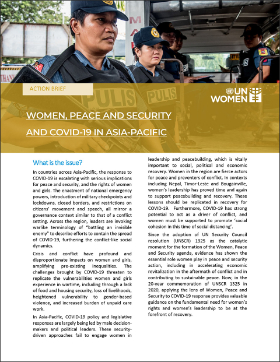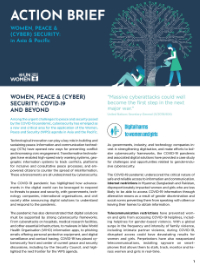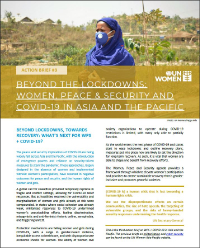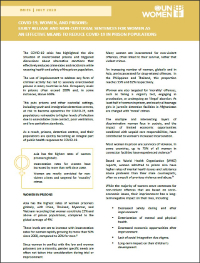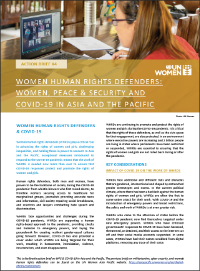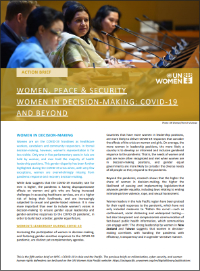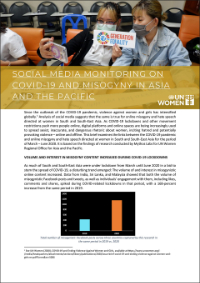Women, Peace and Security, and COVID-19 in Asia-Pacific
The Women, Peace and Security (WPS) agenda has never been more relevant than during the COVID-19 global pandemic. COVID-19 represents a threat to international peace and security in its own right. The pandemic is a conflict multiplier, and women’s roles in preventing conflict and in responding to the health crisis are vital to support. However, as in conflict situations, the use of emergency powers and militarized responses has gendered impacts. Women’s equal participation and gender-sensitive protection is needed to mitigate those impacts and enable alternative responses. Furthermore, the importance of women’s meaningful participation and leadership will be necessary as countries in the region move to build back better.
In Asia Pacific, UN Women works to ensure COVID-19 response and recovery is gender-sensitive and responsive to the governance and security situations across the region. This brief series explores various issues as related to COVID-19 and the WPS agenda.
Women Peace and Security, and COVID-19 In Asia-Pacific
In countries across Asia-Pacific, the response to COVID-19 is escalating with serious implications for peace and security, and the rights of women and girls. The enactment of national emergency powers, introduction of military checkpoints and lockdowns, closed borders, and restrictions on citizens’ movement and speech, all mirror a governance context similar to that of a conflict setting. This brief introduces the issue, presents considerations of the implications of COVID-19 in the women, peace and security agenda and offers some recommendations on the way forward.
Action Brief: Women, Peace & (Cyber) Security in Asia and the Pacific
Among the urgent challenges to peace and security posed by the COVID-19 pandemic, cybersecurity has emerged as a new and critical area for the application of the Women, Peace and Security (WPS) agenda in Asia and the Pacific.
Action Brief: Beyond the Lockdowns: Women, Peace & Security and COVID-19 in Asia and the Pacific
The Women, Peace and Security agenda provides a framework through which to elevate women’s participation and priorities to create sustainable recovery that is gender-inclusive and promotes peaceful societies. This brief provides an overview of the gendered peace and security considerations in the next phase of COVID-19 response, and recommendations for all actors involved.
The COVID-19 crisis has highlighted the dire situation of overcrowded prisons and triggered discussions about alternative sanctions that effectively reduces crime rates and recidivism while ensuring health and safety of the prison population.
This brief explores key ways that the work of WHRDs has been impacted by the COVID-19 crisis, and how countries can ensure the work of WHRDs is recognized and protected during this time.
Women, Peace & Security | Women in decision-making: COVID-19 and beyond
Women are on the COVID-19 frontlines as healthcare workers, caretakers and community responders. In formal decision-making, however, women’s representation is far less visible. Only one in five parliamentary seats in Asia are held by women, and men hold the majority of health leadership positions. This gender disparity has been further highlighted during the COVID-19 crisis when, with very few exceptions, women are overwhelmingly missing from pandemic response and recovery.
Social Media Monitoring on COVID-19 and Misogyny in Asia and the Pacific
Since the outbreak of the COVID-19 pandemic, violence against women and girls has intensified globally. Analysis of social media suggests that the same is true for online misogyny and hate speech directed at women in South and South-East Asia. As COVID-19 lockdowns and other movement restrictions push more people online, digital platforms and online spaces are being increasingly used to spread sexist, inaccurate, and dangerous rhetoric about women, inciting hatred and potentially provoking violence – online and offline. This brief examines the links between the COVID-19 pandemic and online misogyny and hate speech directed at women in South and South-East Asia for the period of March – June 2020. It is based on the findings of research conducted by Mythos Labs for UN Women Regional Office for Asia and the Pacific.
